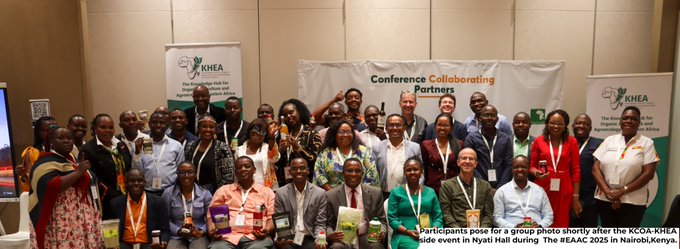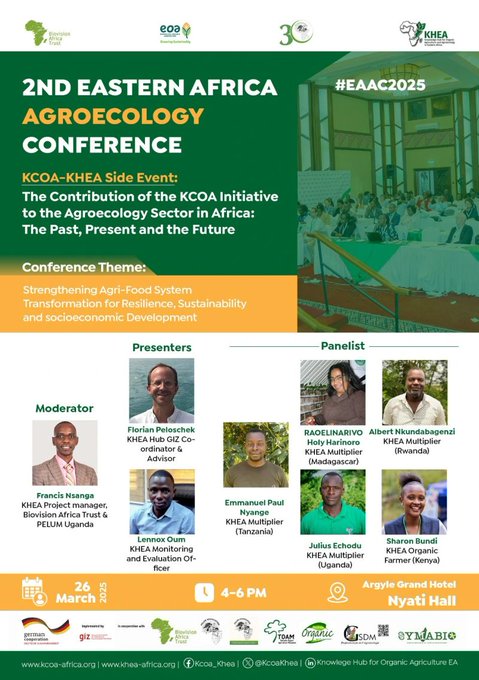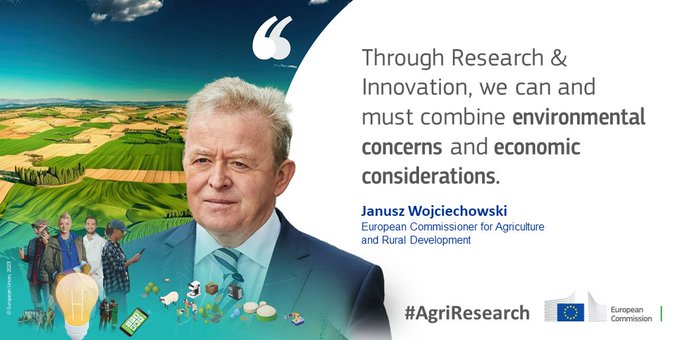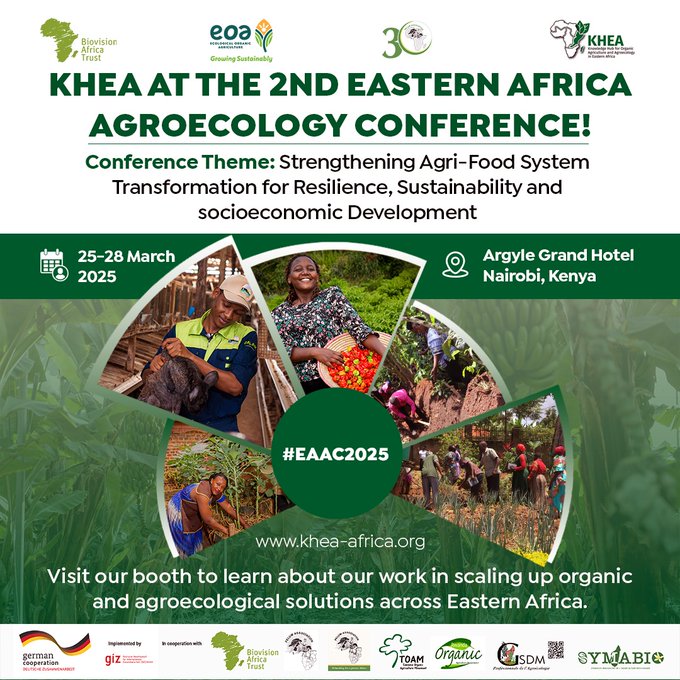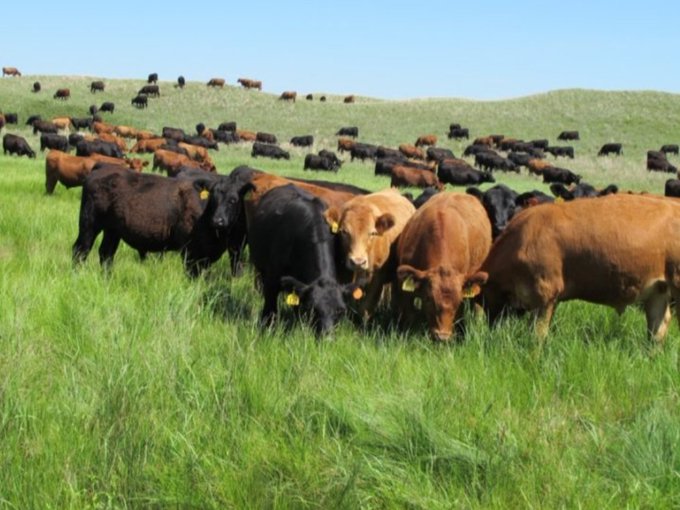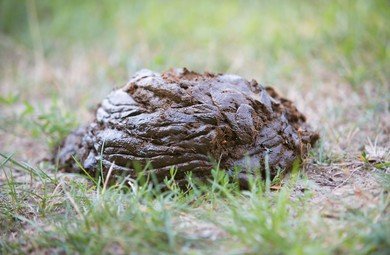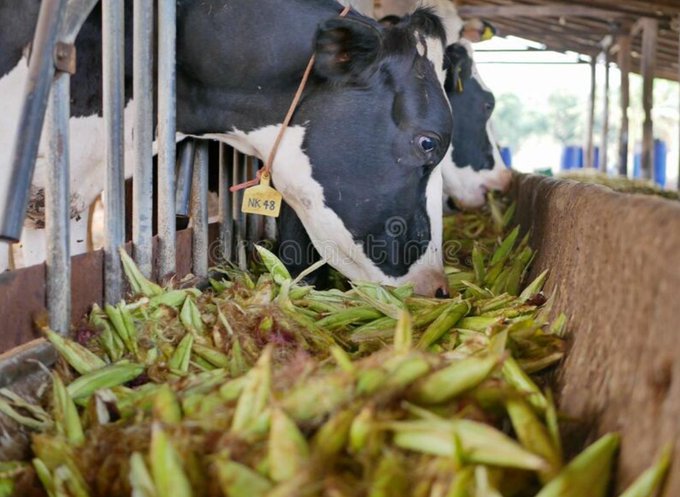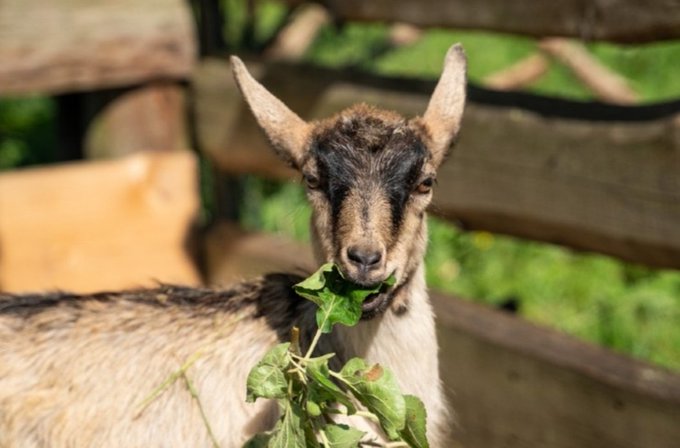NAIROBI, Kenya – This week, stakeholders in the agricultural sector converged in Nairobi, Kenya, for the 2nd Eastern Africa Agroecology Conference
The conference was held from March 25 to 28, 2025, involving sit sessions and field excursions.
The three-day event was a hybrid conference comprising in-person attendance and live streaming for online participants.
It aimed to motivate key stakeholders to invest in interventions that transform current unsustainable food systems by transitioning towards more environmentally friendly solutions with long-term vision and planning.
📸 A moment to remember!After an engaging KCOA-KHEA Side Event at the #EAAC2025,we captured this group photo to celebrate the insights,collaborations&impactful discussions on agroecology🌱Let’s keep pushing for a sustainable&resilient future! #KHEA #KCOA #SustainableFarming
During the conference, a group of experts amplified a critical yet often overlooked voice—the role of animal welfare in sustainable food systems.
Why animals matter to the ecosystem
Sally Kahiu, representing World Animal Protection, fired the first salvo, indicating that animals are not just about agriculture; they are about the welfare of the entire ecosystem.
“Agroecology—is it a buzzword, a promise, or a revolution? This conference features farmers, smallholder farmers, revolutionaries, visionaries, policymakers, and changemakers who have come together to transform the way we grow food and the way we consume food,” Kahiu said.
However, she observed that the role of animal welfare in agroecology discussions has been a mere whisper.
“Just a soft hum in the background of food systems discussions. But we need it to be a loud clarion call. Animals are not just about agriculture. Animals are about the welfare of the entire ecosystem, and we need this to be understood by all stakeholders in the agroecology space,” she added.
The EU allocated €9 billion of #HorizonEU funds to agricultural research and innovation.@jwojc opens the #AgriResearch conference explaining how EU funding will support agroecology, animal welfare, precision agriculture and more.
Y News understands that animal welfare and agroecology have similar objectives, such as improving animal health and well-being, decreasing dependency on outside inputs, and fostering biodiversity.
Animal well-being can be greatly enhanced by agroecological techniques, including rotational grazing, combining livestock and crop production, and giving animals access to a variety of fodder.
How agroecology can feed the entire population
These techniques frequently result in less stress, healthier animals, and more organic behaviours. Additionally, by reducing environmental effects and promoting resilient agriculture methods that benefit both the environment and animals, agroecology supports sustainable food systems.
Uganda’s Minister of State for Agriculture, Animal Industry, and Fisheries (Agriculture), Fred Bwino Kyakulaga, observed that agroecology strives for the transformation of food systems to feed a growing population while conserving nature and strengthening communities.
“As agroecological food systems are based on diversity, resilience, and equity, they can tackle climate, biodiversity, and hunger crises together. Thanks to its cross-cutting principles, agroecological food systems can help achieve the Sustainable Development Goals,” he emphasised.
To develop trust in agroecology as basis for transitioning food systems towards food security, nutrition and safety, employment and resilience to climate change, evidence should be assembled and shared. #EAAC2025 Biovision Conf 2025
Kyakulaga said that he had joined other stakeholders in chatting a way forward on how to feed the ever-growing population while conserving biodiversity.
Y News knows that livestock are found in all regions of the world and supply a wide range of products and services such as meat, milk, eggs, fibre, hides and skins, natural fertilisers, fuel, transport, and drought power.
Why animals are important to livelihoods
They are kept by more than half of rural households and are essential to livelihoods, nutrition, and food security. If managed sustainably, they can contribute to important ecosystem functions such as nutrient cycling, soil carbon sequestration, and the conservation of agricultural landscapes.
Animals can also improve livelihoods and incomes. However, the rapid development of the livestock sector in response to growing demand has given rise to several risks.
Integrating livestock into cropping systems leads to reduced risk of raising a single product. Increased water infiltration and resistance to soil erosion. Increased soil organic matter. Let’s do crop liverstock integration to maximize profit and reduce wastage of resources.
Most of this development has taken place in large-scale and intensive systems, with relatively little contribution from small-scale producers or pastoralists.
According to the Food Agriculture Organisation (FAO), tensive systems account for about 60% of global pork or chicken meat, although they still provide less than 15% of beef or milk production.
Concerns are also growing over the impact of the livestock sector on the climate and the environment, the role of livestock in global food security and nutrition, as well as in sustainable and healthy diets, animal health, and particularly the impact of zoonotic diseases on public health and animal welfare.
Why the conference matters to most stakeholders
FAO states that many means of addressing these risks involve optimising interactions between animals, plants, humans, and the environment and hence are relevant to agroecology, an approach based on applying ecological concepts and principles to agriculture while taking into consideration the social aspects that need to be addressed for sustainable and fair food systems.
At the 2nd Eastern Africa Agroecology Conference in Nairobi, We’re amplifying a critical yet often overlooked voice—the role of animal welfare in sustainable food systems. “Animals are not just about agriculture; they are about the welfare of the entire ecosystem.” 🌿🐄
From pastoralists to small-scale crop-livestock farmers, many livestock keepers already practice agroecology.
Y News has established that the transition will be more challenging for some production systems than others.
Kahiu, just like the rest of the stakeholders who attended the conference, said they were looking forward to the outcomes of the conference.
“We must work together with other partners from other countries to make this a reality to move from a whisper to a powerful united voice to the world food systems that we want in Africa,” said Kahiu.



